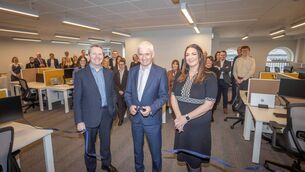From the Leaving Cert to a job, apprenticeship or higher education

For students who are still unsure about their next step, there is much help available.
It’s a big moment in anyone’s life, but receiving your Leaving Cert results is just the start of the next chapter.
As students and their families look to the future, two big questions tend to arise: where to go next, and how to fund it.
Navigating career or further education options, and the financial reality of the latter, often calls for thought, planning, and a little expert support.
The world of work is changing rapidly, with advancements such as AI transforming the landscape at breakneck speed.
Long-established careers that are familiar and desirable now may not exist in the future, while entirely new roles that we don’t yet know about will appear.
The key, says Nessa White, interim chief executive officer of Solas, the Further Education and Training (FET) Authority, is flexibility.
Students who learn to adapt and upskill will be able to pivot and seize new opportunities.
“Recent research and analysis of online job adverts by our Skills and Labour Market Research Unit at Solas shows that employers are increasingly seeking transversal skills such as adaptability, a willingness to learn, effective teamwork, and the ability to work efficiently with strong attention to detail and time management,” says White.
“Recognising the growing emphasis on more versatile skills, my advice to students is to stay open-minded, explore all your options and, above all else, focus on finding the right fit for you. FET and apprenticeships open exciting doors and can help you build a career with purpose, based on your strengths and interests.”
This is echoed by Damien Owens, director general of Engineers Ireland.
“As young people consider their future careers, a new challenge has emerged: will this job exist in five or 10 years?” he says.
If you’re unsure of what career to embark on, it’s worth looking at where the demand currently is, along with the growth opportunities.
Engineering is one such in-demand sector, Owens says: “In an era of rapid change, an engineering qualification offers a strong foundation, providing financial stability, a sense of purpose, and the skills to succeed across a wide range of industries.”
As Owens explains, the World Economic Forum’s Future of Jobs Report 2025 lists four engineering roles among the top 15 fastest-growing occupations worldwide – and there is no shortage of opportunities for graduates here in Ireland. “Ireland is facing a critical shortage of engineers,” he says.
“According to Engineers Ireland research, over 22,300 additional engineers will be needed here over the next decade.
“Several engineering roles are on the national Critical Skills Occupations List, including civil and structural engineers, mechanical, electrical, electronic, chemical, design and development, and production and process engineers.”
With Irish qualifications recognised globally, it’s an industry that offers potential and stability in a rapidly changing world.
“Engineering graduates are not just employable, they are essential,” Owens adds.
“Whether tackling climate change, improving energy and food security, or addressing housing shortages, engineers play a vital role in solving society’s most pressing challenges. For today’s students, it is one of the most future-proof and impactful choices they can make.”
For students who are still unsure about their next step, there is much help available. The Adult Educational Guidance and Information Service (AEGIS) offers free, independent advice on education and career paths nationwide.
The Right Course (see gov.ie), an initiative by the Department of Further and Higher Education, Research, Innovation and Science, is an online portal with information on further education and training.
If you’re thinking of studying or working in Europe, Europass ( europass.europa.eu) lets you search for qualifications, courses and learning opportunities in other EU countries.
Yet, for many students, and undoubtedly their parents, the challenge isn’t just choosing a course but managing the cost that comes with it.

The Higher Education Authority’s Free Fees Initiative means eligible undergraduate students from EU/EEA countries don’t pay tuition fees in the traditional sense.
However, a “student contribution” – set at €2,500 for the 2025/26 year – still applies, and there are plenty of other costs too.
In 2024, a report by Switcher.ie, a price-comparison service, estimated the average cost of attending college in Ireland at €15,632 a year.
There are financial supports available, however, in the form of grants and bursaries, which can go a long way towards paying fees, accommodation costs and living expenses. Student Universal Support Ireland (SUSI) is the main awarding authority for further and higher education grants.
There is support available for eligible students in approved Post Leaving Certificate (PLC), undergraduate and postgraduate courses – and, in some cases, for students studying outside Ireland. You can check eligibility criteria at susi.ie.
The move into third-level education – and perhaps living away from home for the first time – can be a lot to navigate.
With that in mind, the Citizens Information Board (CIB) has published a booklet, Information for School Leavers, which provides information on education and employment.
MABS, the Money Advice and Budgeting Service (funded by the CIB), can provide all sorts of financial advice for students.
It has created a free Financial Readiness for Life course in conjunction with Atlantic Technological University (ATU).
Designed to boost student financial literacy, it’s yet another helpful tool for students embarking on this new path.
Planning your next move after the Leaving Cert can feel overwhelming, but with good advice and smart planning, students can take control of their future.
From guidance counsellors to financial supports like SUSI and MABS, expert help is available every step of the way.







